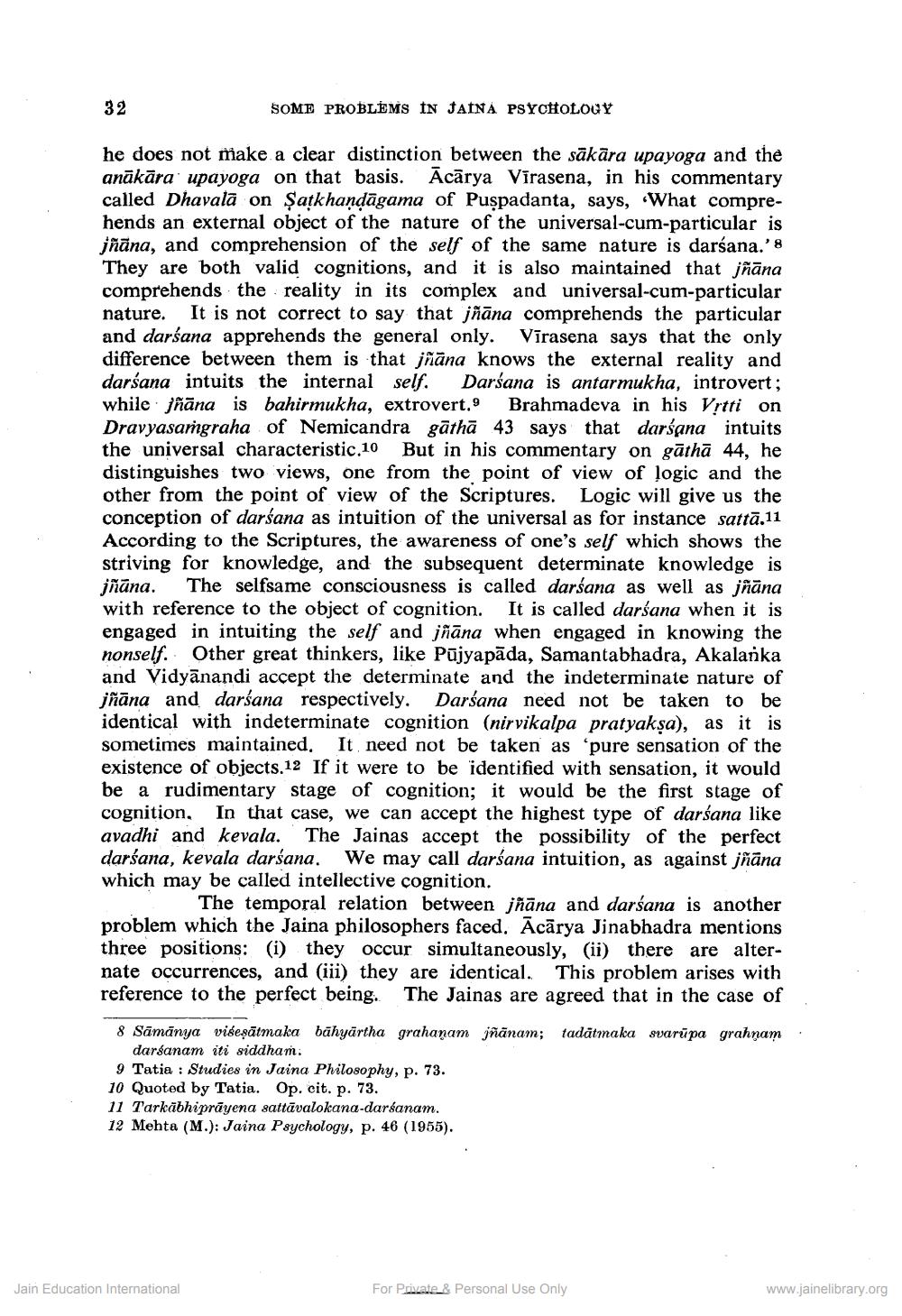________________
32
SOME PROBLEMS IN JAINA PSYCttotody
he does not make a clear distinction between the sākāra upayoga and the anākāra upayoga on that basis. Acārya Vīrasena, in his commentary called Dhavala on Satkhandāgama of Puşpadanta, says, “What comprehends an external object of the nature of the universal-cum-particular is jñāna, and comprehension of the self of the same nature is darśana.'' They are both valid cognitions, and it is also maintained that jñāna comprehends the reality in its complex and universal-cum-particular nature. It is not correct to say that jñāna comprehends the particular and darśana apprehends the general only. Vīrasena says that the only difference between them is that jñāna knows the external reality and darśana intuits the internal self. Darśana is antarmukha, introvert; while jñāna is bahirmukha, extrovert.9 Brahmadeva in his Vrtti on Dravyasaṁgraha of Nemicandra gāthā 43 says that darśana intuits the universal characteristic.10 But in his commentary on gāthā 44, he distinguishes two views, one from the point of view of logic and the other from the point of view of the Scriptures. Logic will give us the conception of darśana as intuition of the universal as for instance sattā.11 According to the Scriptures, the awareness of one's self which shows the striving for knowledge, and the subsequent determinate knowledge is jñāna. The selfsame consciousness is called darśana as well as jāna with reference to the object of cognition. It is called darśana when it is engaged in intuiting the self and jñāna when engaged in knowing the nonself. Other great thinkers, like Pūjyapāda, Samantabhadra, Akalanka and Vidyānandi accept the determinate and the indeterminate nature of jñāna and darśana respectively. Darśana need not be taken to be identical with indeterminate cognition (nirvikalpa pratyaksa), as it is sometimes maintained. It need not be taken as 'pure sensation of the existence of objects. 12 If it were to be identified with sensation, it would be a rudimentary stage of cognition; it would be the first stage of cognition. In that case, we can accept the highest type of darśana like avadhi and kevala. The Jainas accept the possibility of the perfect darśana, kevala darśana. We may call darśana intuition, as against jñāna which may be called intellective cognition.
The temporal relation between jñāna and darśana is another problem which the Jaina philosophers faced. Ācārya Jinabhadra mentions three positions: (i) they occur simultaneously, (ii) there are alternate occurrences, and (iii) they are identical. This problem arises with reference to the perfect being. The Jainas are agreed that in the case of
jñānam; tadātmaka svarūpa grahnam
.
8 Sāmánya viseşātmaka bāhyārtha grahanam
darsanam iti siddham. 9 Tatia : Studies in Jaina Philosophy, p. 73. 10 Quoted by Tatia. Op. cit. p. 73. 11 Tarkābhiprāyena sattāvalokana-darsanam. 12 Mehta (M.): Jaina Psychology, p. 46 (1955).
Jain Education International
For Private & Personal Use Only
www.jainelibrary.org




